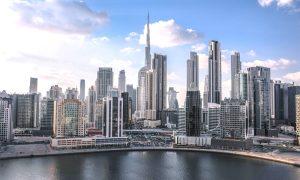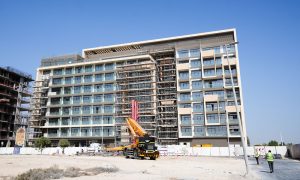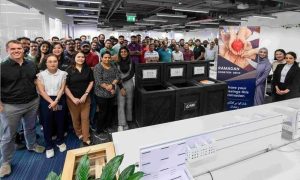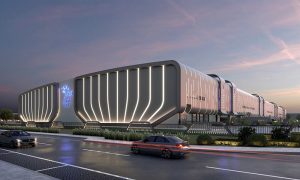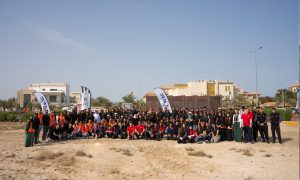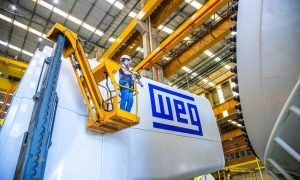Destination City
Gavin Davids visits the construction site of Doha Festival City, Qatar’s upcoming retail powerhouse.

As a result developers have begun expanding outwards, building their projects in Doha’s suburbs, a strategy that has allowed them to not only build bigger, but also build smarter. Given the freedom to grow, there have been a spate of ambitious retail projects, with the Villaggio Mall one of the most prominent examples of the trend.
Now, however, a mall is being built that will eclipse all others in Qatar. Indeed, the Doha Festival City project will eclipse most malls in the Middle East, as Kareem M Shamma, CEO of Bawabat Al Shamal Real Estate Company (BASREC), tells Big Project ME during a visit to the project’s site offices.
“We’re at 250,000m2 of gross leasable area and that’s by far the largest in Qatar. I think the only other larger mall in the GCC is the Dubai Mall at the moment. I say at the moment because you never know who is planning what in the GCC!”
However, Doha remains a city that harbours ambitions to rival Dubai as the tourist capital of the GCC. To achieve that, it has to offer tourists a chance to see something that they won’t get in the UAE.
This is why the Doha Festival City is so important. If being the flagship development for BASREC wasn’t pressure enough, the project will be the standard by which all malls in Qatar will be judged, and proof positive that Doha can cut it as a viable tourist destination.
“I think the sheer size of it is going to be a category killer,” Shamma asserts. “It’s going to dwarf all the other malls. That’s the first thing, its size. Secondly, I always call this the first international mall in Doha because of the experience and partnership that comes from the UAE in the form of Al Futtaim.
“They’ve done Dubai Festival City and Cairo Festival City (amongst others), so in that sense, they’ve opened international malls and I think it’ll be the first of its kind in Doha. The others have been locally conceived and built and operated-type malls. We’ve raised the bar with international standards now.”
This embrace of international standards is something that Shamma believes will serve the mall well in the future, with careful consideration given to all areas of the customer experience, right from the approach to the mall, to the flow of shoppers around the mall and the entertainment packages on offer.
“How we’re differentiating ourselves is with the offering itself. We’re anchoring the mall at the north end, obviously, with IKEA, which has proved to be very popular. That would then be an integral part of the north end of the mall. There’ll be direct access from within the mall to IKEA and the hypermarket,” he explains.
“The south end is the other major draw for this mall, with a massive entertainment complex planned. It’s 30,000m2 of internal and external entertainment. To our knowledge, this is the first time that any mall – throughout the Middle East – has combined, to such a large extent, both internal and external entertainment.
“Internally, there are things like a snow play box. It’s a snow slope which has moved on from current offerings by two or three generations. There are things like zorbing and toboggan runs, which are more interesting than just basic skiing,” Shamma points out. “Then there’s obviously the family entertainment area like you see in a lot of the other malls. But that’s also what we wanted to avoid, just having that bolted onto the side of the mall.
“The way we’ve arranged it at one end is that we have a huge food and beverage area, a food court that is central to this area internally, that overlooks the snow, overlooks the family entertainment area and overlooks the external entertainment centre.”
He continues: “Now what is the external entertainment area? We’ve got a Rapid River Ride, which is going to be spectacular, we’ve got zip wires above it. There’s more extreme, adrenaline-type sports outside. We’ve also got a traditional funfair, with a reverse bungee in a steel cage.”
Clearly this is all going to take up a considerable amount of space, but as mentioned earlier, the reason a number of developers are looking to building their projects outside of Doha city is because of the space, which is one of the main things on offer.
Stretching out across 433,000m2, the Doha Festival City project will have space for more than 550 international brands, with many making their debut in Qatar. In addition, there are approximately 8,500 car parking spaces being incorporated into the construction, with two multi-storey parking lots being built, along with underground parking under the whole mall and over-ground parking near IKEA.
Construction completion is expected by the third or fourth quarter of 2016, BASREC have consistently said, despite the lengthy delays that have hit the project.
Work on the project was set to commence in 2013 however, just as construction work was about to start, Qatar’s Public Works Authority (Ashghal) announced that it would be upgrading highways around the site.
This meant that work on the project had to be stopped and the upgrades taken into account. However, the project team decided to use the delay as an opportunity to improve the project design, with ramps into and out of the project being included.
With the total estimated cost of the project coming in at $1.64 billion, the need to get every aspect of the project right is essential, especially given the pre-existing delays. Keeping control and overseeing this aspect of the project performance is Michael Connor, commercial manager for Faithful + Gould, who are the commercial managers for the project.
“We are looking at the financial control and reporting of the development performance against budget and cost to complete position,” he tells Big Project ME. “We have more of a strategic review of the commercial management. In terms of driving the value engineering, the cost challenges, the design development, that’s under EC Harris’ remit. We’re available to support that, but our involvement is more, in a sense, to check contractual arrangements and administration of the development,” Connor explains.
“There’s an incredible breadth of information generated on the project, such as the various construction contracts. We as consultants are having to digest a large amount of information to give the correct advice to our client. In terms of working within a project team, it’s going very well and it will continue to do so. The companies that are involved have complimentary skill sets and are quite clear on the direction and target of the development.”
Two of the companies currently involved in the project are ALEC Qatar and Gulf Contracting Company, who are currently involved in the foundation construction for the mall. When Big Project ME spoke to Shamma, work was just about to begin, with final preparations underway. At the time of print, construction is well underway.
“They’re mobilising at the moment, they’re currently doing some basic dewatering, which was subject to getting the requisite permits and they’re now gearing up with site offices and site equipment. You should see, within one or two weeks, actual construction on the site,” he says. “Typically, with this sort of construction, it takes a while to get out of the ground. Fortunately, we anticipated this and have already completed our bulk excavation. We awarded a separate contract before this one (the substructure construction contract) under a separate, temporary permit, and we completed the bulk excavation of the site. Most of the site is down to its basic levels.”
“Now the substructure contractor will do detailed excavation, specifically the area of his foundation. It’s in rock, so that could take a bit of time. We’ve also got some groundwater, which is another challenge, but that’s typical of any groundwork construction. Once we get out of the ground, I don’t anticipate that there’ll be anything too challenging, because in the end, even though it’s a beautifully designed structure, it’s still a two storey building with a basement. It’s very functional and we’re not pioneers or on the cutting edge of shopping malls, we’re doing something that works best for the retailer and the customer,” he points out.
Connor chimes in to add that with the substructure package well underway, thoughts are already turning towards the next stage of the project, which is looking at how to bring forward elements of the work, so as to finish things according to schedule.
“We’re negotiating a fast-track procurement approach to appoint the superstructure and contractor for the mall, to basically finish the job as soon as possible,” he explains. “Once we get the second part of the development consent, it’s about taking the initiative from BASREC and looking to secure a contract to deliver the mall.”
“The target for the development just now is to achieve a trading date within the third quarter of 2016. We’re trying to secure a contract in a more buoyant market, so the quicker we can do that, the better we can get a jumpstart on the other major infrastructure works that will be happening. We’ll still find it a little bit tough, but the benefits are that there isn’t anything of this scale and prestige in the retail sector, so I’m sure the supply chain will be very keen to do business,” Connor adds.
This future planning becomes even more interesting when the sheer logistical challenge of the project is considered. With Shamma revealing that 10,000 workers are expected to be on-site at the peak of construction, getting a grip on logistical issues is crucial to the project’s success.
“We work with our contractors to iron out these logistical issues,” Shamma says. “It’s a challenge, but I wouldn’t call it a problem yet. It’ll be a challenge to bring in a number of people into and out of the site, where they’ll be accommodated and all, but our guys are very good on health and safety and environment.”
Recent reports on Qatar-based contractors have not looked favourably on the treatment of workers. Shamma says that his operation prioritises their welfare.
“We often go to contractor camps and check on conditions there, even the remote camps. There are strong policies on health and safety, which our project managers, Mace, take very seriously. We take it seriously as a client as well, it’s always foremost in our minds. The well-being of the people onsite is essential and you get good results out of it at the end, with (increased) productivity and efficiency. That’s always of prime concern, and rightly so. Gone are the days of poor conditions on site, dangerous conditions and so forth. The more the construction community in Qatar can work on that and move towards more awareness of HSE, the better,” he points out.

